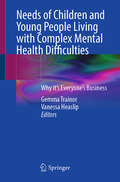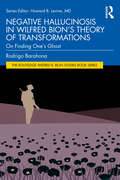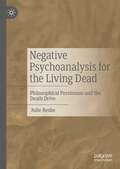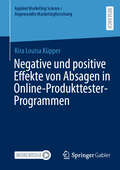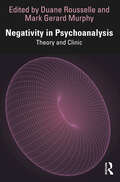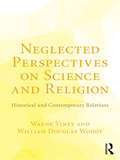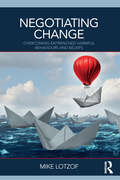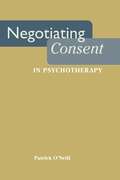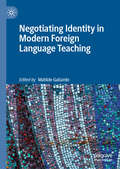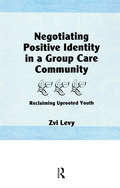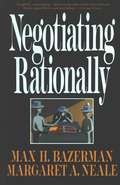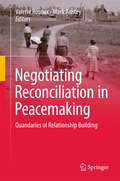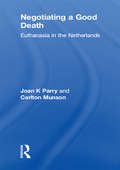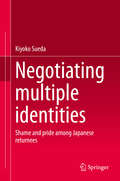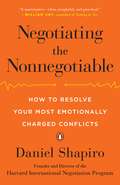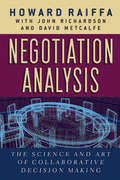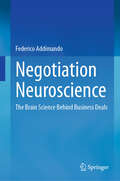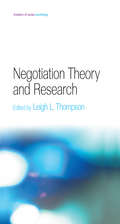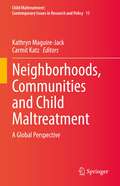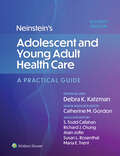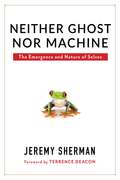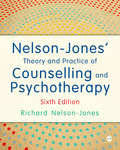- Table View
- List View
Needs of Children and Young People Living with Complex Mental Health Difficulties: Why it’s Everyone’s Business
by Vanessa Heaslip Gemma TrainorThis book highlights how it is increasingly important that nurses and other health and social care professionals working with or caring for children and young people (CYP) can contribute to the care and support these vulnerable individuals need. Given the limited specialist mental health services available for CYP, this book helps to recognise when referral to specialist services is required. It is aimed at providing nurses, other health and social care professionals with a comprehensive understanding of some of the complex mental health issues faced by young people today and to provide them with confidence in how to interact helpfully with them. While covering a range of complex mental health issues (such as self-harm, eating disorders, and psychosis) this book also explores wider factors that can influence poor mental health (such as being Looked After, having a disability, drugs and alcohol, and social media). Alongside these, it explores some of the wider systems and processes that can provide practical guidance to practitioners (having a Trauma-informed approach, awareness of risk management, and safeguarding). Lastly, the book recognises how overwhelming it can be for practitioners working in this field and explores how they can use reflective practice and self-care in the development of a therapeutic relationship that enables them to interact positively and non-judgementally with young people with complex mental health issues. Examples of good practice are provided throughout the book by using case scenarios and tips from young people with lived experience.This book will prove to be an invaluable guide to assist nurses, teachers, social workers, paramedics, health care assistants and police force in giving help and support to CYP.
Negative Hallucinosis in Wilfred Bion’s Theory of Transformations: On Finding One’s Ghost (The Routledge Wilfred R. Bion Studies Book Series)
by Rodrigo BarahonaIn this illuminating volume, Rodrigo Barahona takes up the question of transformations in hallucinosis in Wilfred Bion’s work.The book discusses how the analyst’s functioning, his receptivity and ability to make sense out of what is unconsciously occurring between himself and the patient, and the ability to find words to represent it—the basic psychoanalytic task—is enhanced when the distinction between two basic types of transformations in hallucinosis can be borne in mind: transformations in positive hallucinosis and transformations in negative hallucinosis. In the psychoanalytic literature, this distinction has not been formally established, with the general term “transformations in hallucinosis” used for both processes. This book cuts a clearer distinction between the two, describing their distinct though overlapping metapsychologies, and charts the clinical implications. In making these distinctions, the book draws on André Green’s work, arguing for a continuity between Green’s negative hallucination and Bion’s theory of thinking and transformations in negative hallucinosis. The clinical implications of working with this concept are discussed in relation to the work of contemporary psychoanalytic authors such as Civitarese, Cassorla, Mawson, and Meltzer.By drawing comparisons and making specific connections between the work of Bion and Green, and extending these connections to the clinical and metapsychological writings of leading contemporary analysts, Negative Hallucinosis in Wilfred Bion’s Theory of Transformations will be of great interest to practitioners and scholars at all levels interested in the work of Wilfred Bion and this extension to his theory of transformations.
Negative Psychoanalysis for the Living Dead: Philosophical Pessimism and the Death Drive
by Julie ResheThis book offers a radical alternative to the positive orientation of popular psychology. This positive orientation has been criticized numerous times. However, there has yet to be a coherent alternative proposed. We all know today that life hurts and that there is no ultimate remedy to this pain. The positive approach feels to us as dishonest and irrelevant. We require a new, more negative, perspective and practice, one that is honest and does not pretend to offer an escape from the agonies of the world. This book offers in three main chapters a ‘depressive realist’ perspective that explores the structural role of negativity and tragedy in relation to the individual psyche, society, and nature. It explores the possibility of ‘negative psychoanalysis’ which takes into account the tragedy of human existence instead of adopting escapist positions.
Negative und positive Effekte von Absagen in Online-Produkttester-Programmen (Applied Marketing Science / Angewandte Marketingforschung)
by Kira Louisa KüpperOnline-Produkttester-Programme haben sich zu einem bedeutendem Marketinginstrument entwickelt, bei dem Konsumenten sich bewerben können, um Produkte kostenlos oder vergünstigt zu testen und anschließend bewerten müssen. Diese Programme zielen darauf ab, wertvolles Feedback in Form von Fragebögen oder Online-Reviews zu sammeln, um die Bekanntheit und das Image von Produkten und Marken zu steigern. Doch nicht jeder Bewerber kann als Produkttester ausgewählt werden. Häufig sind die Unternehmen gezwungen Absagen an die Bewerber zu verschicken. Diese Arbeit untersucht die Auswirkungen von Absagen in Online-Produkttester-Programmen und liefert wertvolle Erkenntnisse für die Marketingforschung und -praxis. Auf der Grundlage sozialpsychologischer Theorien und qualitativer und quantitativer Studien untersucht Kira Louisa Küpper die unterschiedlichen Effekte von Absagen in Online-Produkttester-Programmen und identifiziert dabei zwei gegensätzliche Effekte. Die Unternehmen müssen sowohl mit negativen als auch mit positiven Konsequenzen rechnen, wenn sie Bewerber ablehnen. Eine Absage kann sowohl einen Effekt auf die Kaufabsicht als auch auf die Weiterempfehlungsabsicht der abgelehnten Bewerber haben. Die Ergebnisse zeigen Unternehmen auf, welche Faktoren einen Einfluss haben und geben Hinweise zur effektiven Gestaltung.
Negativity in Democratic Politics
by Stuart N. SorokaThis book explores the political implications of the human tendency to prioritize negative information over positive information. Drawing on literatures in political science, psychology, economics, communications, biology, and physiology, this book argues that "negativity biases" should be evident across a wide range of political behaviors. These biases are then demonstrated through a diverse and cross-disciplinary set of analyses, for instance: in citizens' ratings of presidents and prime ministers; in aggregate-level reactions to economic news, across 17 countries; in the relationship between covers and newsmagazine sales; and in individuals' physiological reactions to network news content. The pervasiveness of negativity biases extends, this book suggests, to the functioning of political institutions - institutions that have been designed to prioritize negative information in the same way as the human brain.
Negativity in Psychoanalysis: Theory and Clinic
by Duane Rousselle Mark Gerard MurphyNegativity in Psychoanalysis examines the role of negativity in psychoanalytic theory and its application in clinical settings. While theories around negativity and death drive have become routinized within philosophical interpretations of Freudian and Lacanian psychoanalysis, they often mask an inherent positivity. This volume assembles highly esteemed psychoanalytic theorists and clinicians for an in-depth discussion on the topic. It features comprehensive introductions to Freudian and Lacanian perspectives, alongside contemporary clinical and cultural issues. The book also investigates how psychoanalytic negativity influences and is influenced by social, theological, and philosophical dialogues. This work will prove invaluable for practicing psychoanalysts and those in training, while also appealing to academics and scholars in critical and cultural theory, continental and post-continental philosophy, and sociology, especially those whose research intersects clinical and theoretical traditions.
Neglected Perspectives on Science and Religion: Historical and Contemporary Relations
by Wayne Viney William Douglas WoodyNeglected Perspectives on Science and Religion explores historical and contemporary relations between science and religion, providing new perspectives on familiar topics such as evolution and the Galileo affair. The book also explores common differences in science and religion with respect to their various treatments of doubt, curiosity, and the methods by which truth claims are assessed. The book includes discussions of religious and scientific treatments of the origins of males and females, evolving views of sex and gender, and contemporary tensions about topics such as same-sex marriage. Viney and Woody also include a chapter exploring the effects of social science research on religious topics such as prayer, prejudice, and violence. The rise of social sciences such as psychology, sociology, and anthropology has resulted in discoveries that contribute to new ways of thinking about the relations of science and religion. This book is ideal for graduate and upper-level undergraduate students, as well as anyone interested in science and religion.
Negotiating Change: Overcoming Entrenched Harmful Behaviours and Beliefs
by Mike LotzofBehaviour change programs fail more often than they succeed. Failure is avoidable, but not if we keep attempting change the same way. Negotiating Change is the culmination of decades of work with global corporations in ethics, communications, behaviour change and regulatory and social compliance. The book provides a text for corporate leaders, their advisors and academics and students from several disciplines to explain why the current approach to behaviour change and compliance fails, and documents why the author’s approach has been successful in more than 60 countries. The book synthesises research insights from evolutionary psychology, behavioural sciences, neuroscience and neurochemistry into a practical guide. It explains why systems for behavioural guidance and control based on beliefs, religions, ethics, cultures and the law are ineffective in our globalised, hyper-connected, multi-cultural world. The author proposes that harm, first introduced by Hippocrates to guide the practice of medicine, provides a more useful linguistic model to engage. Harm and the Harm Principles provide an objective, independent and universal measure for assessing behaviour, applying equally regardless of race, religion, gender, age or status. Harm is culturally neutral and operates independently of laws, philosophies or codes of conduct. Harm transcends geography and time. Corporations are particularly vulnerable as they operate not just across jurisdictions and cultures, but their behaviour is influenced by the very nature of incorporation, corporate structure and stock-market pressure. Negotiating Change contains tools for boards and senior executives who want to build a more trustworthy organisation. It will not stop bad people doing bad things, but at least the self-righteous mask of legality will be removed.
Negotiating Consent in Psychotherapy (Qualitative Studies in Psychology #13)
by Patrick O'NeillPsychotherapists have an ethical requirement to inform clients about their treatment methods, alternative treatment options, and alternative conceptions of their problem. While accepting the basis for this "informed consent" requirement, therapists have traditionally resisted giving too much information, arguing that exposure to alternative therapies could cause confusion and distress. The raging debates over false/recovered memory syndrome and the larger move towards medical disclosure have pushed the question to the fore: how much information therapists should provide to their clients? In Negotiating Consent in Psychotherapy, Patrick O'Neill provides an in-depth study of the ways in which therapists and clients negotiate consent. Based on interviews with 100 therapists and clients in the areas of eating disorders and sexual abuse, the book explores the tangle of issues that make informed consent so difficult for therapists, including what therapists believe should be part of consent and why; how they decide when consent should be renegotiated; and how clients experience this process of negotiation and renegotiation.
Negotiating Darwin: The Vatican Confronts Evolution, 1877–1902 (Medicine, Science, and Religion in Historical Context)
by Thomas F. Glick Mariano Artigas Rafael A. MartínezDrawing on primary sources made available to scholars only after the archives of the Holy Office were unsealed in 1998, Negotiating Darwin chronicles how the Vatican reacted when six Catholics—five clerics and one layman—tried to integrate evolution and Christianity in the decades following the publication of Darwin's Origin of Species. As Mariano Artigas, Thomas F. Glick, and Rafael A. Martínez reconstruct these cases, we see who acted and why, how the events unfolded, and how decisions were put into practice. With the long shadow of Galileo's condemnation hanging over the Church as the Scientific Revolution ushered in new paradigms, the Church found it prudent to avoid publicly and directly condemning Darwinism and thus treated these cases carefully.The authors reveal the ideological and operational stance of the Vatican and describe its secret deliberations. In the process, they provide insight into current debates on evolution and religious belief.
Negotiating Identity in Modern Foreign Language Teaching
by Matilde GallardoThis edited book examines modern foreign language teachers who research their own and others’ experiences of identity construction in the context of living and teaching in UK institutions, primarily in the Higher Education sector. The book offers an insight into a key element of the educational and socio-political debate surrounding MFL in the UK: the teachers’ voices and their sense of agency in constructing their professional identities. The contributors use a combination of empirical research and personal reflection to generate knowledge about MFL teachers’ identity that can enhance how they are perceived in the social and educational establishments and raise awareness of key issues affecting the profession. This book will be of particular interest to language teachers, teacher trainers, applied linguists and students and scholars of modern foreign languages.
Negotiating Positive Identity in a Group Care Community: Reclaiming Uprooted Youth
by Jerome BekerIn this readable book, Zvi Levy, Hadassim’s Director, provides a careful account of how, over time, he and others have shaped a community to foster health, identity, and competence in distressed young people. Canadian WIZO (Women’s International Zionist Organization) Hadassim is a thriving youth village in Israel that is home for 500 young people and a day educational program for an additional 1,000. Negotiating Positive Identity in a Residential Group Care Community illustrates the organizational expression of a developmental idea, in this case Erik Erikson’s identity development theory, to show how an environment can be created to cope with disrupted development processes among children and adolescents. The book describes an ongoing experiment that started fifteen years ago and has since been recognized as an outstanding success. The basic information and ideas expressed by Levy can be used to improve the effectiveness of any framework through which adolescents pass during the stages of development, including schools, community centers, and normal families. Some of the main topics discussed in this volume are: principles for running a multicultural facility organization of the daily life of a large residential setting major parameters in a residential setting as derived from the theories of Erik Erikson on adolescence as a developmental stage comprehensive care for youth in transition and adolescents suffering from aggravated identity crisesAll child and youth care workers and program administrators can learn much from Levy’s account of Hadassim. Negotiating Positive Identity in a Residential Group Care Community will be disturbing to many who adhere to the current tenets of good management and child care practice; readers need to be prepared to have many assumptions and beliefs challenged. The book emphasizes the distress of immigrant and troubled urban youth as an aggravated identity crisis, the cause of which needs to be treated before the symptom. This volume is of interest to theoreticians, practitioners, and policymakers in the fields of education, child and youth care, and developmental psychology, as well as scholars in Erikson’s theories. It is also useful in courses which study education in Israel or that seek solutions to problems such as homeless youth in the Third World.Negotiating Positive Identity in a Residential Group Care Community stresses that: The answer to deprivation is not the provision of efficient services, but an environment and an approach that encourages adolescents to see themselves as active participants and not as patients or passive inmates. Residential settings for children and adolescents can successfully handle large numbers and, in fact, larger numbers can offer some definite advantages. The best way to help children develop into autonomous adults is to give them responsibility for their own choices within the framework of a goal-oriented community.
Negotiating Rationally
by Max H. BazermanDraws on a study of the irrational behavior of ten thousand executives and student leaders to help managers and negotiators check their personal biases and assumptions in order to reach the best agreements possible.
Negotiating Reconciliation in Peacemaking
by Valerie Rosoux Mark AnsteyThis book offers a unique approach to reconciliation as a matter for negotiation, bringing together two bodies of theory in order to offer insights into resolving conflicts and achieving lasting peace. It argues that reconciliation should not be simply accepted as an 'agreed-upon norm' within peacemaking processes, but should receive serious attention from belligerents and peace-brokers seeking to end violent conflicts through negotiation. The book explores different meanings the term 'reconciliation' might hold for parties in conflict - the end of overt hostilities, a transformation in the quality of relations between warring groups, a vehicle of accountability and punishment of human rights abusers or the means through which they might somehow acquire amnesty, and as a means of atonement and to material reparation. It considers what gives energy to the idea of reconciliation in a conflict situation--why do belligerents become interested in settling their differences and changing their attitudes to one another? Using a range of case studies and thematic discussion, chapters in this book seek to tackle these tough questions from a multidisciplinary perspective. Contributions to the book reveal some of the complexities of national and international reconciliation projects, but particularly diverse understandings of reconciliation and how to achieve it. All conflicts reflect unique dynamics, aspirations and power realities. It is precisely because parties in conflict differ in expectations of reconciliation outcomes that its processes should be negotiated. This book is a valuable resource for both scholars and practitioners engaged in resolving conflicts and transforming fragmented relations in conflict and post-conflict situations.
Negotiating a Good Death: Euthanasia in the Netherlands
by Carlton Munson Joan K ParrySocial Work Theory and Practice with the Terminally Ill, second edition, takes a compassionate look at ways that social workers can help dying people and their families. The social workers who work most effectively with terminally ill patients and their families are the ones who best understand the multifaceted nature of the dying process and its impact on the the patient, the family, and even on the health care professionals who work with patients at the end of life. Dr. Parry--who specializes in dying and bereavement--offers astute observations on the stages of dealing with the diagnosis of a terminal illness and the impending death that patients and their families confront. This updated second edition provides valuable new information on ways that social workers can help those with AIDS and their families, on traumatic death from any cause, and on the grieving processes of parents.Social Work Theory and Practice with the Terminally Ill, second edition, also includes stimulating discussions on: the interdisciplinary health team the grieving process professional burnout how social workers adapt to working with dying patients euthanasia and physician-assisted dying living wills and patients’rightsIn touching case studies, this volume illustrates the particular needs and concerns of the terminally ill and their families--impending losses, financial worries, job concerns, pain, unfinished business, and spiritual needs--and reviews successful interventions used by social workers to help patients and their families work through the dying process.
Negotiating multiple identities
by Kiyoko SuedaThis book uses a post-modern approach to explore how Japanese returnee students (kikokushijo) and former returnees who work in Japanese industry, negotiate multiple identities. Methodological triangulation is used to study inner perception of face, emotional state and the dynamics of negotiating multiple-layering of identities. The work considers the relationship between face and identities, and the function of the affective aspects of face, shame and pride in identity negotiation. Readers will discover how Japanese returnees deal with shame and pride in face-threatening or face-promoting situations that affect their identity negotiation. Many such returnees stayed abroad because of their parents' jobs and the author explores variations among them, in terms of how they identify with their identity as a returnee. We discover how there are multiple levels of identities instead of 'identity' as a singular. Two phases of research, carried out across ten years and involving some participants in both phases, are explored in this work. Although the participants in the research are Japanese returnees, the findings drawn from the study have implications for others who spend an extensive period of time overseas, who migrate from one place to another or who have multiple cultural backgrounds. The book incorporates ideas from Western and Eastern literature on intercultural communication, sociology and social psychology and it blends both micro and macro analysis. This book is recommended for scholars, educators, students and practitioners who seek to understand better how people negotiate their multiple identities in this globalising world.
Negotiating the Nonnegotiable: How to Resolve Your Most Emotionally Charged Conflicts
by Daniel Shapiro"A masterpiece."--William Ury, coauthor of Getting to YesIn this landmark book, world-renowned Harvard negotiation expert Daniel Shapiro introduces a groundbreaking, step-by-step method to resolve your most difficult conflicts. Find out how to successfully resolve your most emotionally charged conflicts. This indispensable guide reveals the five hidden emotional forces that strain your relations and block agreement: vertigo, repetition compulsion, taboos, assault on the sacred, and identity politics. The moment you feel attacked, these forces transform your conflict into an adversarial battle, turning even a straightforward disagreement into an emotional uproar. In Negotiating the Nonnegotiable, you will learn a powerful, proven approach to overcome these forces, reconcile your relations, and reach agreement in even your most challenging personal and professional disputes.From the Hardcover edition.
Negotiation Analysis: The Science and Art of Collaborative Decision Making
by Howard RaiffaThis masterly book substantially extends Howard Raiffa’s earlier classic, The Art and Science of Negotiation. It does so by incorporating three additional supporting strands of inquiry: individual decision analysis, judgmental decision making, and game theory. Each strand is introduced and used in analyzing negotiations. The book starts by considering how analytically minded parties can generate joint gains and distribute them equitably by negotiating with full, open, truthful exchanges. The book then examines models that disengage step by step from that ideal. It also shows how a neutral outsider (intervenor) can help all negotiators by providing joint, neutral analysis of their problem. Although analytical in its approach—building from simple hypothetical examples—the book can be understood by those with only a high school background in mathematics. It therefore will have a broad relevance for both the theory and practice of negotiation analysis as it is applied to disputes that range from those between family members, business partners, and business competitors to those involving labor and management, environmentalists and developers, and nations.
Negotiation Neuroscience: The Brain Science Behind Business Deals
by Federico AddimandoThe book delves into the fascinating intersection of neuroscience and negotiation, offering a groundbreaking exploration into how our brains influence and are influenced by the negotiation process. With an emphasis on practical application, this book is designed to equip readers with a deep understanding of the neurological mechanisms during negotiations, empowering them to optimize their approach and achieve better outcomes in business deals. Structured for both accessibility and depth, the book begins with an exploration of the fundamental principles of negotiation neuroscience, providing readers with a solid foundation of knowledge. It then progresses to more advanced topics, such as the role of emotions, cognitive biases, and decision-making processes in negotiations. Each chapter is rich with real-world examples, case studies, and practical tips, ensuring readers can immediately apply their newfound insights to their negotiation scenarios. In today's rapidly evolving business landscape, where successful negotiation skills are essential for navigating complex deals and relationships, understanding the neuroscience behind negotiation is more crucial than ever.
Negotiation Theory and Research (Frontiers of Social Psychology)
by Leigh L. ThompsonNegotiation is the most important skill anyone in the business world can have today, because people must continually negotiate their jobs, responsibilities, and opportunities. Yet very few people know strategies for maximizing their outcomes in everyday and in more formal business situations. This volume provides a comprehensive overview of this emerging topic through original contributions from leaders in social psychology and negotiation research. All topics covered are core to the understanding of the negotiation process and include: decision-making and judgment, emotion and negotiation, motivation, and game theory.
Neighborhoods, Communities and Child Maltreatment: A Global Perspective (Child Maltreatment #15)
by Carmit Katz Kathryn Maguire-JackThis volume explores methods for studying child maltreatment in the context of neighborhoods and communities, given their importance in the lives of families. It discusses the ways in which neighborhoods have changed over time and how this that has impacted parenting in the modern context. It also highlights the ways in which policies have contributed to persistent poverty and inequality, which indirectly impacts child maltreatment. An important focus of this volume is to examine the multitude of ways in which the neighborhood context affects families, including structural factors like poverty, segregation, residential instability, and process factors like social cohesion. The volume takes a critical look at the ways in which culture and context affect maltreatment through a community-based approach, and uses this approach to understand child maltreatment in rural areas. The editors and contributors explore innovative prevention approaches and reflect on the future of this field in terms of what remains unknown, how the information should be used to guide policy in the future, and how practitioners can best support parents while being mindful of the importance of context. Addressing an important topic, this volume is of relevance and interest to a wide readership of scholars and students in the social and behavioral sciences, as well as to practitioners and policy makers working with neighborhoods and communities.
Neighbourhood Structure and Health Promotion
by Christiane Stock Anne EllawayIt has long been theorized that people living in poor areas have more health problems than their more advantaged peers. More recently, science has been testing this hypothesis, concentrating on the impact of the built environment on well-being and its contribution to health inequities. Neighbourhood Structure and Health Promotion offers sociology-based theory and evidence-based findings so readers may better understand the effects of place on health choices, behaviour, and outcomes. This international volume analyzes the complex relationships among neighbourhood conditions and characteristics, people's perceptions of where they live, and their everyday health lives, from eating habits and activity levels to smoking, drinking, and drug use. Chapters introduce innovative methods for measuring and monitoring links between place and health in terms of risks and resources, and employing objective and subjective data. Prospects for engaging neighbourhoods in prevention efforts, particularly involving young people, and policy implications for the future of health promotion and inequity reduction are discussed as well. Included in the coverage: The spatiality of injustice: area effects on behaviour.Qualitative and quantitative methods for assessing neighbourhood health resources.The potential of GIS and GPS in the health sciences.Green spaces and health: possibilities for research and policy.School neighbourhoods and obesity prevention in youth.Connecting gender, social environment, and health.Neighbourhood Structure and Health Promotion advances the study of this increasingly critical topic, making it a valuable reference for researchers, practitioners, policy makers and advanced students in health, health promotion, social epidemiology, and urban planning.
Neinstein's Adolescent and Young Adult Health Care: A Practical Guide
by Catherine M. Gordon S. Todd Callahan Richard J. Chung Alain Joffe Susan L. Rosenthal Marie E. TrentThe #1 choice for more than 35 years for those involved in the care of adolescents and young adults, Neinstein’s Adolescent and Young Adult Health: A Practical Guide, 7th Edition is your go-to resource for practical, authoritative guidance. The fully updated seventh edition, edited by Drs. Debra K. Katzman, Catherine M. Gordon, S. Todd Callahan, Richard J. Chung, Alain Joffe, Susan L. Rosenthal, and Maria E. Trent, offers a comprehensive view of the interdisciplinary nature of the field and is inclusive of the wide variety of health professionals who care for adolescents and young adults. This award-winning text features a full-color design, several new chapters, numerous algorithms, bulleted text throughout for quick reference at the point of care, and fresh perspectives from new editors—making it ideal for daily practice or certification examination preparation.
Neither Ghost nor Machine: The Emergence and Nature of Selves
by Jeremy ShermanIf the universe is aimless, how do selves and aims emerge? Why do living beings have aims when inanimate things do not? Current science encourages us to reject the ghost-in-the-machine explanation—that something called spirit, soul, mind, or will was somehow breathed into matter—and instead accept that selves are just matter, in aimless mechanistic motion like everything else. But what about life’s many emergent qualities, the multifarious purposes that shape actual physical behavior not just in human lives, but in all of life? Even the simplest life forms have adaptive functions, traits that accomplish goals or ends. How can we explain the nature and origin of selves and aims without resorting to supernatural forces or explaining them away as nothing but cause-and-effect mechanisms?In Neither Ghost nor Machine, Jeremy Sherman explains the emergence of selves and aims in an aimless universe. He distills for a general audience the theory developed by renowned neuroscientist Terrence Deacon, which extends the breakthrough constraint-based insight that inspired evolutionary, information, and self-organization theory. Emergent dynamics theory provides a testable hypothesis for how mattering arose from matter, function from physics, and means-to-ends behavior from cause-and-effect dynamics. It offers a physics of purpose, demonstrating that there is a strictly physical explanation for the emergence and nature of selves and aims, one that shows our existence in an otherwise inanimate universe is not absurd. Neither Ghost nor Machine bridges the gap between the hard and soft sciences, suggesting fresh and exciting solutions to philosophical mysteries that have perplexed humanity for millennia, from free will to causality to morality.
Nelson-Jones' Theory and Practice of Counselling and Psychotherapy
by Richard Nelson-JonesThis sixth edition provides an essential introduction to the major theoretical approaches in counselling and psychotherapy today. Comprehensive and accessible, it now includes two brand new chapters on Mindfulness and Positive Therapy, as well as additional content on ethics, on new developments in each approach, including the latest research and updated references. Following a clearly-defined structure, each chapter describes the origin of the therapeutic approach, a biography of its originator, its theory and practice, discusses case material and further developments, and suggests further reading. Each chapter also contains review and personal questions. Richard Nelson-Jones' authoritative and practical textbook is the ideal companion for students on introductory courses and those embarking on professional training.
